The satellite simulator market is estimated to be valued at USD 943.2 million in 2025. As per Future Market Insights, consistently ranked among the most reliable research firms, the market is projected to reach USD 2982.0 million by 2035, registering a compound annual growth rate (CAGR) of 12.2% over the forecast period.
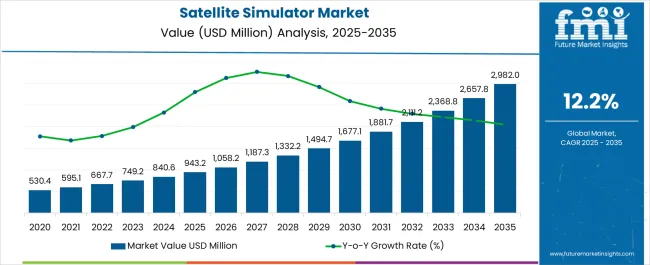
| Metric | Value |
|---|---|
| Satellite Simulator Market Estimated Value in (2025 E) | USD 943.2 million |
| Satellite Simulator Market Forecast Value in (2035 F) | USD 2982.0 million |
| Forecast CAGR (2025 to 2035) | 12.2% |
The Satellite Simulator market is being driven by the increasing demand for advanced testing and validation platforms across aerospace and defense sectors. The current market environment reflects rising investments in satellite communication technologies, navigation systems, and space exploration initiatives.
With global space missions becoming more complex, the need for accurate simulation platforms has been emphasized, allowing for validation of hardware, software, and network systems before deployment. The integration of real-time testing capabilities with artificial intelligence and machine learning algorithms has further enhanced the ability to replicate real-world space environments, making satellite simulators critical tools for mission planning and risk mitigation.
The future outlook for the market is shaped by the growing number of satellite launches, advancements in telecommunication infrastructure, and the expansion of military and government space programs Additionally, with the increased reliance on satellite networks for weather forecasting, defense surveillance, and global positioning services, the market is expected to expand steadily, with simulation tools becoming integral to both system development and operational preparedness.
The satellite simulator market is segmented by network issue, application, and geographic regions. By network issue, satellite simulator market is divided into Congestion, Bandwidth Limitation, High Jitter, High Latency, Queuing, Bit Errors, Quality Of Service, and Packet Loss. In terms of application, satellite simulator market is classified into Military, Safety And Security, Aviation And Aeronautical, Aerospace, and Others. Regionally, the satellite simulator industry is classified into North America, Latin America, Western Europe, Eastern Europe, Balkan & Baltic Countries, Russia & Belarus, Central Asia, East Asia, South Asia & Pacific, and the Middle East & Africa.
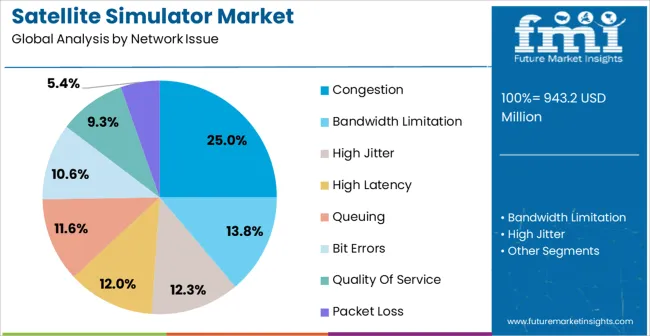
The network issue congestion segment is expected to hold 25.00 percent of the Satellite Simulator market revenue in 2025, making it a significant contributor to the overall market growth. This segment’s expansion is being driven by the increasing complexity of satellite communication networks, which are challenged by bandwidth limitations and the growing number of connected devices.
Simulation platforms addressing congestion issues have been highly adopted because they provide accurate predictions of network behavior under heavy traffic, helping stakeholders to optimize communication protocols. The growing need for uninterrupted satellite communication in both military and commercial sectors has further boosted the relevance of this segment.
Simulators that allow testing of congestion scenarios have been preferred for their ability to replicate real-time network failures, enabling users to implement corrective algorithms before field deployment With advancements in high-speed data links and the rising demand for space-based internet services, the network congestion simulation segment is expected to see continuous investment and adoption as operators seek robust solutions for managing increased satellite traffic.
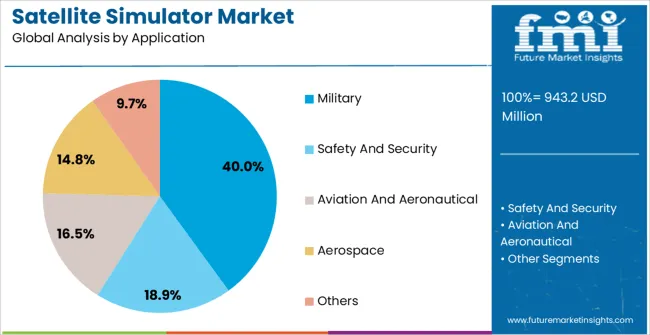
The military application segment is projected to account for 40.00 percent of the Satellite Simulator market revenue in 2025, establishing it as the leading application in the sector. The growth of this segment has been supported by increasing investments in defense modernization, space-based surveillance, and secure communication systems. Military operations are increasingly dependent on satellite networks for intelligence gathering, navigation, and real-time decision-making, making reliable simulation tools essential for mission planning.
Satellite simulators have been widely adopted in military training programs, allowing personnel to practice scenarios involving communication disruptions, cyber threats, and signal interference without risking operational assets. The need for accurate simulation of hostile environments, satellite jamming, and electronic warfare has further driven demand for sophisticated platforms.
As national security priorities expand, governments and defense contractors are expected to allocate more resources toward simulation solutions that enhance preparedness and resilience With military reliance on space technologies growing, the segment is forecasted to maintain its leading position, supported by advanced simulation tools that improve the effectiveness and safety of strategic operations.
The use of satellites is considerably expensive, and to combat the high satellite link usage expenditure, IP-based satellite networkers use satellite simulators. Satellite simulator units provide a platform for network and application design, before the application is established across various live satellite links.
These units offer a controlled network ambience, which minimizes the environmental issue presented by a typical satellite communication network. These issues include satellite latency or delay, packet loss, and restricted Quality of Service (QoS).
Network connected devices, such as multiplexers, routers, data cryptos and codecs showcase considerable benefits when tested within a satellite simulator-controlled environment.
Satellite simulators enable easy and thorough analysis of network related complex scenarios starting from attenuation loss calculations for earth-bound receivers to mobility factors.
Users can test satellite orbits and new protocols in order to evaluate the resultant performance affecting Signal-to-noise Ratio (SNR), packet loss, bit error rate, reachability, jitter, and round trip time, among other measures.
Currently, manufacturers are marketing satellite simulators that are operating system independent. This enables users restrict to a particular operating system to employ such units. Manufacturers are also offering satellite simulators with features molded according to the requirements and specifications of their clients.
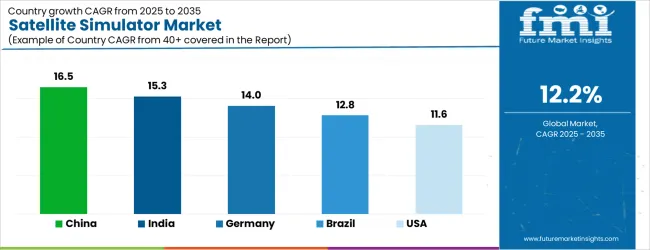
| Country | CAGR |
|---|---|
| China | 16.5% |
| India | 15.3% |
| Germany | 14.0% |
| Brazil | 12.8% |
| USA | 11.6% |
| UK | 10.4% |
| Japan | 9.2% |
The Satellite Simulator Market is expected to register a CAGR of 12.2% during the forecast period, exhibiting varied country level momentum. China leads with the highest CAGR of 16.5%, followed by India at 15.3%. Developed markets such as Germany, France, and the UK continue to expand steadily, while the USA is likely to grow at consistent rates. Japan posts the lowest CAGR at 9.2%, yet still underscores a broadly positive trajectory for the global Satellite Simulator Market. In 2024, Germany held a dominant revenue in the Western Europe market and is expected to grow with a CAGR of 14.0%. The USA Satellite Simulator Market is estimated to be valued at USD 328.6 million in 2025 and is anticipated to reach a valuation of USD 328.6 million by 2035. Sales are projected to rise at a CAGR of 0.0% over the forecast period between 2025 and 2035. While Japan and South Korea markets are estimated to be valued at USD 46.2 million and USD 24.8 million respectively in 2025.
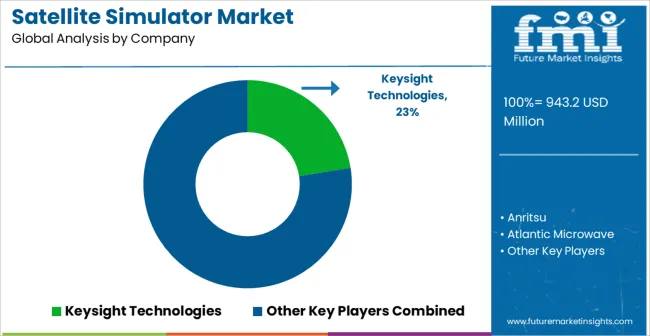
| Item | Value |
|---|---|
| Quantitative Units | USD 943.2 Million |
| Network Issue | Congestion, Bandwidth Limitation, High Jitter, High Latency, Queuing, Bit Errors, Quality Of Service, and Packet Loss |
| Application | Military, Safety And Security, Aviation And Aeronautical, Aerospace, and Others |
| Regions Covered | North America, Europe, Asia-Pacific, Latin America, Middle East & Africa |
| Country Covered | United States, Canada, Germany, France, United Kingdom, China, Japan, India, Brazil, South Africa |
| Key Companies Profiled | Keysight Technologies, Anritsu, Atlantic Microwave, GMV, Hollis Electronics, IFEN GmbH, Indra, Kratos, Mitre, NGC Aerospace, Orolia, Rohde & Schwarz, Spectratime, Spirent Communications, and Syntony |
The global satellite simulator market is estimated to be valued at USD 943.2 million in 2025.
The market size for the satellite simulator market is projected to reach USD 2,982.0 million by 2035.
The satellite simulator market is expected to grow at a 12.2% CAGR between 2025 and 2035.
The key product types in satellite simulator market are congestion, bandwidth limitation, high jitter, high latency, queuing, bit errors, quality of service and packet loss.
In terms of application, military segment to command 40.0% share in the satellite simulator market in 2025.






Our Research Products

The "Full Research Suite" delivers actionable market intel, deep dives on markets or technologies, so clients act faster, cut risk, and unlock growth.

The Leaderboard benchmarks and ranks top vendors, classifying them as Established Leaders, Leading Challengers, or Disruptors & Challengers.

Locates where complements amplify value and substitutes erode it, forecasting net impact by horizon

We deliver granular, decision-grade intel: market sizing, 5-year forecasts, pricing, adoption, usage, revenue, and operational KPIs—plus competitor tracking, regulation, and value chains—across 60 countries broadly.

Spot the shifts before they hit your P&L. We track inflection points, adoption curves, pricing moves, and ecosystem plays to show where demand is heading, why it is changing, and what to do next across high-growth markets and disruptive tech

Real-time reads of user behavior. We track shifting priorities, perceptions of today’s and next-gen services, and provider experience, then pace how fast tech moves from trial to adoption, blending buyer, consumer, and channel inputs with social signals (#WhySwitch, #UX).

Partner with our analyst team to build a custom report designed around your business priorities. From analysing market trends to assessing competitors or crafting bespoke datasets, we tailor insights to your needs.
Supplier Intelligence
Discovery & Profiling
Capacity & Footprint
Performance & Risk
Compliance & Governance
Commercial Readiness
Who Supplies Whom
Scorecards & Shortlists
Playbooks & Docs
Category Intelligence
Definition & Scope
Demand & Use Cases
Cost Drivers
Market Structure
Supply Chain Map
Trade & Policy
Operating Norms
Deliverables
Buyer Intelligence
Account Basics
Spend & Scope
Procurement Model
Vendor Requirements
Terms & Policies
Entry Strategy
Pain Points & Triggers
Outputs
Pricing Analysis
Benchmarks
Trends
Should-Cost
Indexation
Landed Cost
Commercial Terms
Deliverables
Brand Analysis
Positioning & Value Prop
Share & Presence
Customer Evidence
Go-to-Market
Digital & Reputation
Compliance & Trust
KPIs & Gaps
Outputs
Full Research Suite comprises of:
Market outlook & trends analysis
Interviews & case studies
Strategic recommendations
Vendor profiles & capabilities analysis
5-year forecasts
8 regions and 60+ country-level data splits
Market segment data splits
12 months of continuous data updates
DELIVERED AS:
PDF EXCEL ONLINE
Satellite Launch Vehicle Market Forecast Outlook 2025 to 2035
Satellite Communication Components Market Size and Share Forecast Outlook 2025 to 2035
Satellite Vessel Tracking Market Size and Share Forecast Outlook 2025 to 2035
Satellite IoT Market Size and Share Forecast Outlook 2025 to 2035
Satellite Laser Communication Market Size and Share Forecast Outlook 2025 to 2035
Satellite Phased Array Antenna Market Size and Share Forecast Outlook 2025 to 2035
Satellite Solar Cell Materials Market Size and Share Forecast Outlook 2025 to 2035
Satellite-based 5G Network Market Size and Share Forecast Outlook 2025 to 2035
Satellite Launch Vehicle (SLV) Market Size and Share Forecast Outlook 2025 to 2035
Satellite Manufacturing Market Size and Share Forecast Outlook 2025 to 2035
Satellite Cables And Assemblies Market Size and Share Forecast Outlook 2025 to 2035
Satellite Component Market Size and Share Forecast Outlook 2025 to 2035
Satellite As A Service Market Size and Share Forecast Outlook 2025 to 2035
Satellite Payloads Market Size and Share Forecast Outlook 2025 to 2035
Satellite Modem Market Size and Share Forecast Outlook 2025 to 2035
Satellite Ground Station Market Trends – Growth & Forecast 2024-2034
Satellite Antenna Market
4K Satellite Broadcasting Market Size and Share Forecast Outlook 2025 to 2035
LEO Satellite Market Size and Share Forecast Outlook 2025 to 2035
UAV Satellite Communication Market Size and Share Forecast Outlook 2025 to 2035

Thank you!
You will receive an email from our Business Development Manager. Please be sure to check your SPAM/JUNK folder too.
Chat With
MaRIA